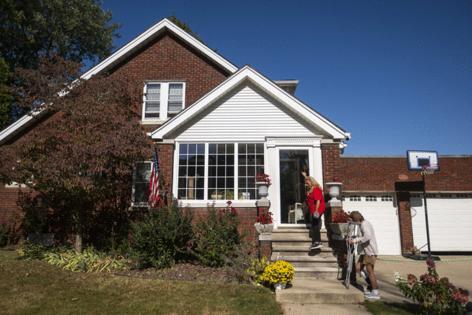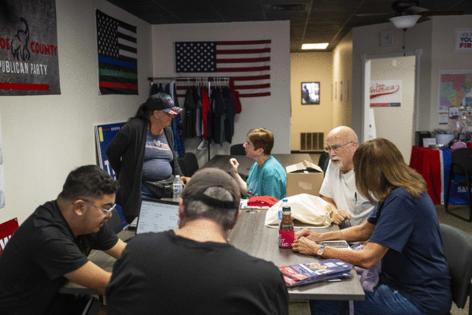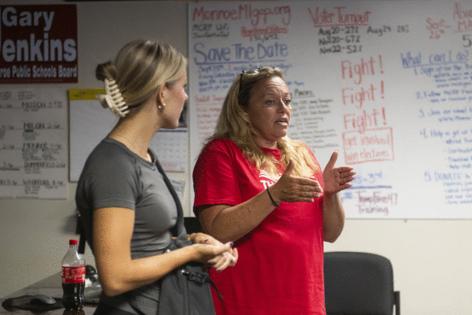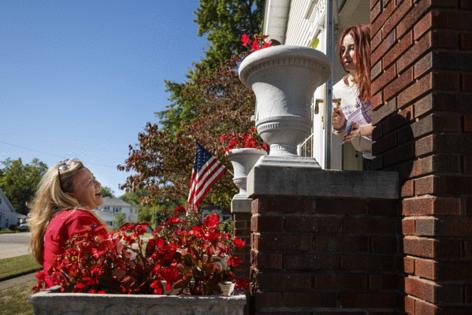Trump campaign pursuing infrequent voters in its bid to beat Harris in Michigan
Published in Political News
LANSING, Mich. — Republicans in Michigan have been focused on activating this fall hundreds of thousands of GOP-leaning voters who have cast ballots only infrequently in the past in hopes of reversing the trend of Democrats dominating high-turnout elections in the state.
Donald Trump's campaign has identified in Michigan somewhere between 200,000 and 500,000 so-called "low propensity" voters — or "low pro" as some have shortened the label — according to interviews with more than a dozen state Republicans.
Officials involved in the Michigan Republican Party said they believe the bloc of voters will cast ballots for the former president if they can be persuaded to get involved in the election. The time, volunteers and financial resources targeting the group represent a bet by the Republicans that could define their success if Trump wins Michigan against Democratic Vice President Kamala Harris and highlight a strategic failure if he loses.
"We think that there were .. somewhere between a quarter and a half million low propensity voters that will most likely vote Republican," said Pete Hoekstra, chairman of the Michigan Republican Party, when asked about the tactic last week.
The low propensity voter strategy involves repeated contacts, through door knocking and phone calls, from Republican volunteers over time, according to those who've participated in it. It's not the only program Michigan Republicans are using this fall, but Hoekstra described it as an ongoing focus of the Trump campaign.
The idea is to get each volunteer to reach out to about 10 low-propensity voters repeatedly up until Election Day, said Brian Pannebecker, a Macomb County resident who started the Facebook group called Auto Workers for Trump.
If three or four of the "low propensity voters" cast ballots when they otherwise would have stayed home, it's a success, Pannebecker said.
"They’ve just tripled or quadrupled the power of their own vote,” Pannebecker said of the initial volunteer.
Over the last six years in Michigan, it's been Democrats who've been touted for their ground game and ability to turn out voters through a county-by-county organizing strategy, known as "Project 83," referring to the state's 83 counties.
Democrats have won the last three statewide elections, including in 2022, when they scored majorities in the Legislature for the first time in four decades. At the top of the ballot in 2022, Democratic Gov. Gretchen Whitmer won by about 10 percentage points, 54%-44%, over Republican Tudor Dixon.
With absentee ballots becoming available in Michigan starting Thursday, closing the gap in ground-level organizing will be key for Republicans if they want to see Trump win the state in November.
"With the number of people that we have out through the party and out through these other organizations ... we've got the best ground game that we've had, probably, in decades," Hoekstra said.
'Burn the ships'
Among those people out for Republicans in Michigan have been Leanne Fisk and her daughter, Amelia, of Macomb Township. They've already knocked on more than 1,200 doors in support of Trump in Macomb County, Leanne Fisk said.
“There are a lot of people that did stay home and didn’t vote in 2020, and had they gone out to vote, it would have made a huge difference," Fisk said.
It's unclear what characteristics the Trump campaign used to identify the 200,000-500,000 low-propensity voters they're now targeting in Michigan. But one Republican who declined to be identified because he wasn't authorized to speak about the formula described it as a "secret sauce."
Victoria LaCivita, spokeswoman for the Trump campaign in Michigan, wouldn't say precisely how many low-propensity voters her team was tracking in Michigan or how they were picked.
"Team Trump continues to build out the most sophisticated and modern campaign ever," LaCivita said. "Our team is only expanding — we are adding new staff, offices and volunteers weekly — with more enthusiasm, energy and support from people and states that Democrats have taken for granted."
Some Republicans said many of the targeted voters were evangelical Christians or interested in hunting.
Fisk said she had heard during her volunteering that there were approximately 300,000 people in Michigan who were into sports like hunting or fishing but didn't vote in 2020.
Regardless, Garrett Soldano, a Republican former candidate for governor from Mattawan, said the message to the low-propensity voters is that if people stay home in November, "that's a vote for a Democrat."
"We’ve got to burn the ships. We’ve got to do everything that we can to get all of those votes," Soldano said of the strategy.
Michigan's 2020 presidential election saw a record voter turnout, with about 5.6 million people participating. About 70% of the voting-age population cast a ballot, according to data from the Secretary of State's office.
The election occurred during the COVID-19 pandemic and amid new policies that allowed Michiganians to vote absentee for any reason. Previously, there were strict guidelines about who could use an absentee ballot in Michigan. Democrat Joe Biden won the election over Trump in Michigan 51%-48% or by a margin of about 154,000 votes.
There have been only two elections in Michigan when the number of voters exceeded 5 million: 2020 and 2008. Like 2020, Democrats also won in 2008, with Barack Obama defeating Republican John McCain by 16 percentage points, 57%-41%.
Big turnout expected
There are additional new voting laws in Michigan for 2024, allowing at least nine days of early in-person voting across the state. And political observers expect a big overall turnout, citing enthusiasm on both sides of the political aisle.
The question is whether Trump and his focus on working-class voters — something past GOP candidates have not had — can upset the trend of Democrats winning high-turnout elections in Michigan.
John Yob, a longtime Republican strategist in Michigan politics, said Trump won the state in 2016 against Democrat Hillary Clinton because "he turned out low propensity voters who had not voted in any of the last four presidential elections."
In that election, about 4.9 million people cast ballots in Michigan. Trump won by less than 1 percentage point, 47.5%-47.3%, or 10,704 votes.
Republicans are training "tens of thousands of GOP activists in the state to put together a far more organized effort to turn out similar low propensity voters who propelled Trump to victory in the past," Yob said.
"He will outperform public polling in Michigan again in 2024, as he did in 2020 and 2016," Yob vowed.
Public polling has generally described the race between Trump and Harris as tied. A late August survey, commissioned The Detroit News and WDIV-TV (Channel 4), found Trump leading by 1.2 percentage points, 44.7%-43.5%, with a 4-point margin of error.
The challenges
The challenges for Michigan Republicans include the fact that the 2020 election had such a massive turnout. For their new strategy to work, they'll have to get the faction of people who didn't think it was worth getting involved in that race to change their minds for 2024.
Likewise, other political consultants cautioned that altering people's behaviors — like their decisions not to participate in elections — is a task that's more difficult than it appears.
As suburban and wealthy voters have shifted away from the GOP and toward Democrats, Republicans have found themselves relying on a group of people who don't vote unless they have a definitive reason pushing them to, said Adrian Hemond, a Democratic consultant and CEO of the Lansing-based firm Grassroots Midwest.
"It does make a certain amount of sense," Hemond said of the low propensity voter strategy the Trump campaign is deploying.
One problem for Michigan Republicans is Trump has previously railed against absentee voting, which will make it harder for the GOP to bank the votes they need to win in Michigan before Election Day, Hemond said.
The longer a voter waits to cast their ballot, the more a political party that wants them to do it has to spend on mail or other outreach efforts to them.
Dennis Lennox, a political consultant and Republican precinct delegate from Cheboygan County, said he simply doesn't believe the GOP has the massive 83-county ground game in place to offset the margins of victory Harris will get in Democratic strongholds like Wayne County.
Lennox said he's been asked by Republicans to be a poll challenger on Election Day but not been asked to knock on doors.
"This election will be won or lost on absentee and early voting," Lennox said. "It's about turnout and running up the margin in red counties. That's how you win."
The Harris campaign has said it has 52 field offices in Michigan. The Trump campaign hasn't identified how many offices it has in Michigan.
"For more than a year, our campaign has been building a strong ground game to mobilize a broad coalition of voters— Democrats and Republicans, Black Michiganders and Hispanic Michiganders, union workers and educators, college students and seniors, and more — to turn the page on Donald Trump and chart a new way forward with Vice President Harris," said Shafeeqa Kolia, a spokeswoman for the Harris campaign in Michigan.
'I had my doubts'
Democrats have out-performed Republicans in absentee voting, as Trump previously described mail-in voting as " very dangerous" and susceptible to fraud.
For example, in Muskegon County, Biden narrowly beat Trump overall, 49.4%-45.1%, in November 2020. But among those who cast absentee ballots, Biden won 62.8%-35.6%.
Now, four years later, the Trump campaign is encouraging people to take advantage of absentee ballots. Standing outside Michigan Republican Party headquarters last Thursday, Hoekstra, the party's chairman, acknowledged the GOP's stance had shifted.
"We had a candidate in 2020 that said, 'Vote on Election Day,'" Hoekstra said referring to Trump, who is also the nominee in 2024.
Now, Hoekstra said the GOP will be trying to "win every Election Day" leading up to Nov. 5.
"Let's try to drive out as many voters as we can," Hoekstra said.
The party will attempt to get as many Republican voters to cast ballots as possible early before Nov. 5 and focus in the final days on turning out those low-propensity voters, Hoekstra said.
In interviews in recent weeks, many Republicans touted the ground game they see taking shape in Michigan this fall.
Eric Castiglia, a Macomb County Republican and the leader of the Brighter Michigan political action committee, said Republicans are upping their canvassing effort to catch up with Democrats who've been "canvassing pros."
The Trump campaign has been aggressive in setting up offices and reaching out to GOP-leaning voters, Castiglia said.
“I had my doubts," Castiglia acknowledged. "I don’t have a problem saying that. But what I’m seeing under Hoekstra and (Michigan Republican Party Executive Director) Tyson (Shepard) is frankly a pretty strong ground game across the state."
_____
©2024 www.detroitnews.com. Visit at detroitnews.com. Distributed by Tribune Content Agency, LLC.



































































Comments